A parallel plate, high N.A. compatible, uniformly temperature controlled microscopic flow cell with a user definable specimen area for inverted microscopes. Includes: FCS2 Chamber, Controller, 5 Micro aqueduct Slides, 100 #1.5 – 40mm German Desag263 Coverslips, and 30 piece Gasket Set
$6,340.25
Overview
The FCS2® Starter Set is an out of the box, versatile solution for micro-environmental control that offers precision temperature and flow control that is compatible with all forms of microscopy. For a more detailed information about the system Click Here.
Features
*Requires purchase of appropriate stage adapter to interface with microscope.
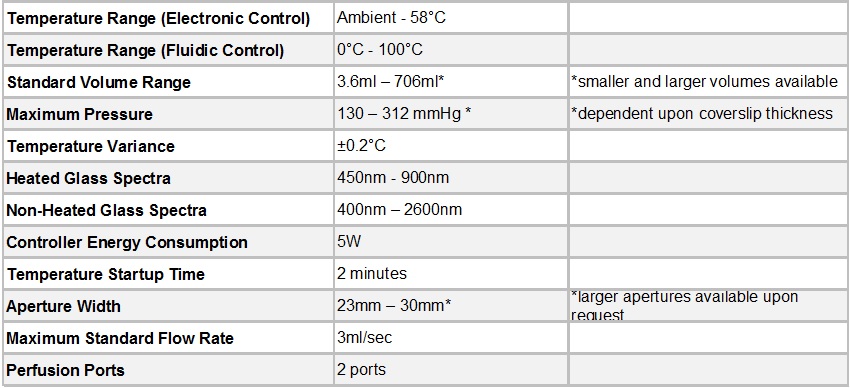
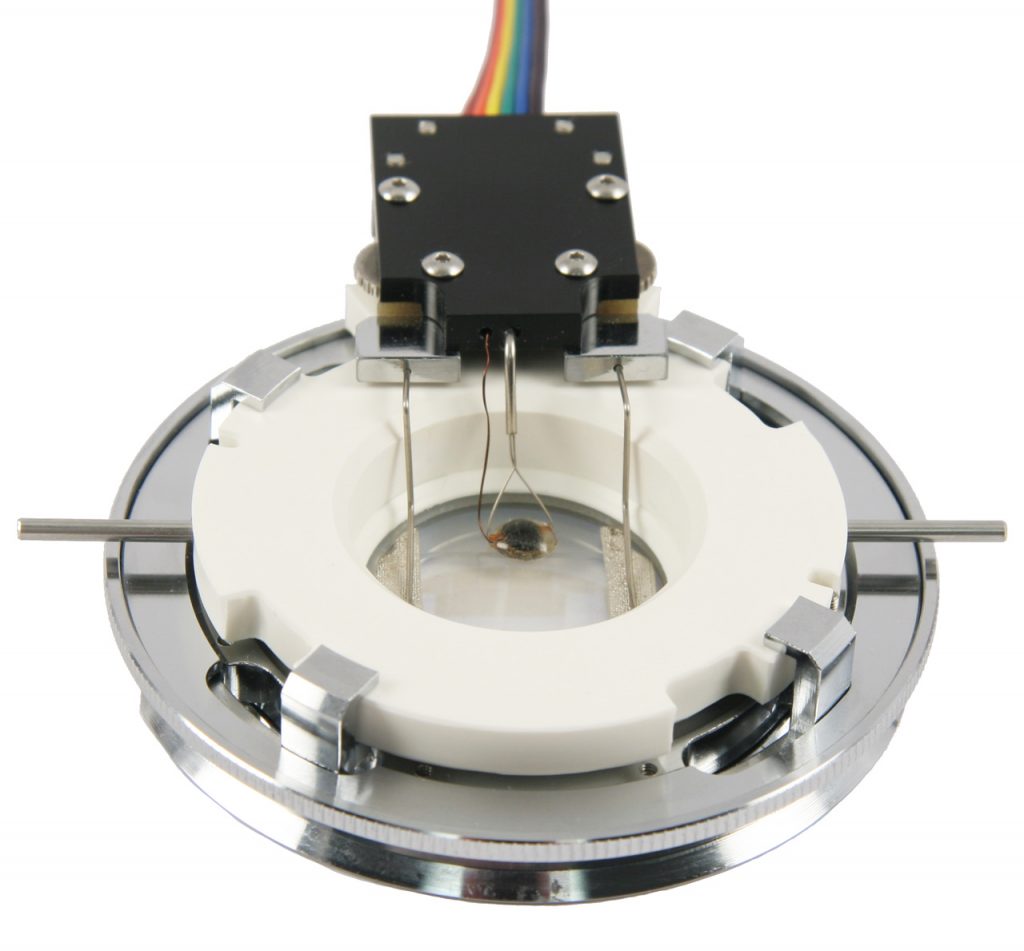
The Focht Chamber System 2 (FCS2®) is a closed system, live-cell micro-observation chamber that utilized several patented technologies that offer several exclusive advantages over other chambers. In addition to its uniform temperature control and user definable perfusion capability, it is fully compatible with all modes of microscopy. It is also the only chamber to combine high-volume laminar flow perfusion rates with Koehler illumination and precise temperature control without the need for an air curtain. This is accomplished by the development of micro aqueduct perfusion. A method of introducing media into a fluid optical cavity where the separation of optical surfaces and flow geometry is definable by the user. Therefore, the chamber is adaptable to the protocol instead of having to adapt the protocol to the chamber. It has limitless flow characteristics because its flow geometry can easily be customized by the user. It provides the ability to configure the optical cavity to produce control shear forces, flow characteristics, high or low volume exchange rates, near laminar flow, and anything in between. The most important feature of the FCS2, other than unequalled temperature uniformity, is that the is flow of media is constrained to a precise location over the cells. Open dish type chambers do not provide the flow capabilities of the FCS2. The FCS2 provides unmatched, uniform temperature control, in a user configurable, perfusable, optical imaging cavity.
Cells are grown on a 40mm glass coverslip. This coverslip is then incorporated into a perfusable fluid optical cavity that is compatible with all modes of microscopy, and its geometry can be easily defined by the user. This optical cavity is secured into a fixture on the stage of the microscope where it can be perfused with media or remain static. Media that comes into one of the ports on the side of the chamber, emerges in a fluid optical path where the media is precisely directed over the cells. The media is collected within the optical cavity and directed out of the chamber on the other side. The flow characteristics of the media while in the optical cavity are easily modified by selecting gaskets of varying geometry that direct the flow. Temperature control is maintained by both peripheral thermal support from the chamber’s metal frame and heat that is emitted from an electrically conductive optically transparent coating on the “window” of the optical cavity. This technique provides uniform temperature control across the entire field, thus eliminating the temperature gradient that occurs with other designs. This technique also enables the FCS2 to recover from perfusion induced temperature fluctuations in just seconds.
The FCS2 was designed to maintain accurate thermal control and allow high-volume laminar flow perfusion. Both of these functions are incorporated into our patented Microaqueduct Slide (see drawing below). The surface of the slide, opposite the specimen side, is coated with an electrically conductive transparent thin film of Indium-Tin Oxide (ITO) and two electrical contacts (busbars). When the FCS2 is completely assembled two electrical contacts, (not shown in drawing), which are contained in the electrical enclosure rest on the busbars. A temperature controller is used to pass a regulated current flow through the ITO Coating. This causes the surface of the slide to heat. The heat is transferred through the perfusable media to the cell surface on the coverslip thereby providing first surface thermal control. The self-locking base of the chamber is also temperature regulated to provide peripheral heat as well. 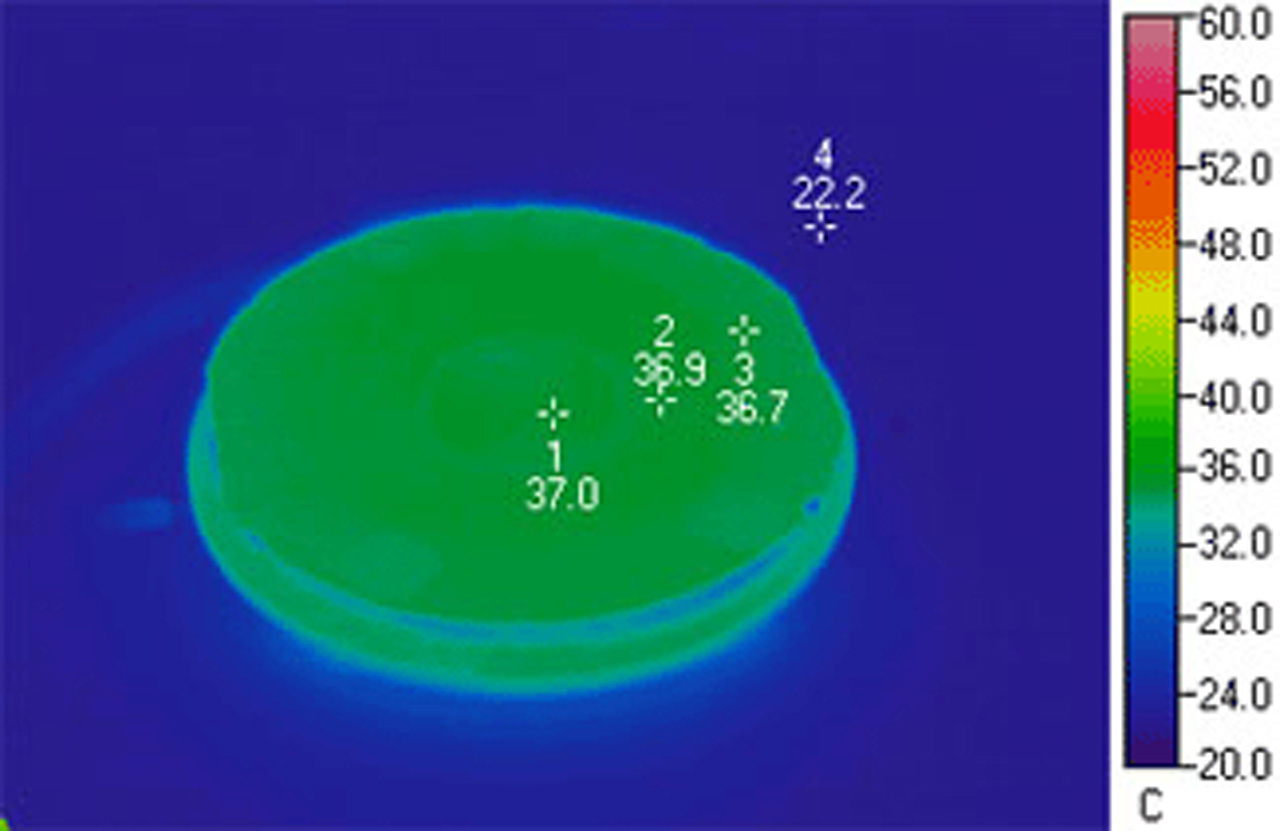
This thermographic image demonstrates the uniform temperature distribution of an FCS2. Notice that the coverslip temperature is so uniform that its location, in infrared, is indistinguishable from the base of the chamber. This demonstrates the effectiveness of the ITO heated Microaqueduct Slide. It is capable of re-equilibrating cell temperature within seconds of perfusion and eliminates the typical thermal gradient that occurs with peripheral heating.
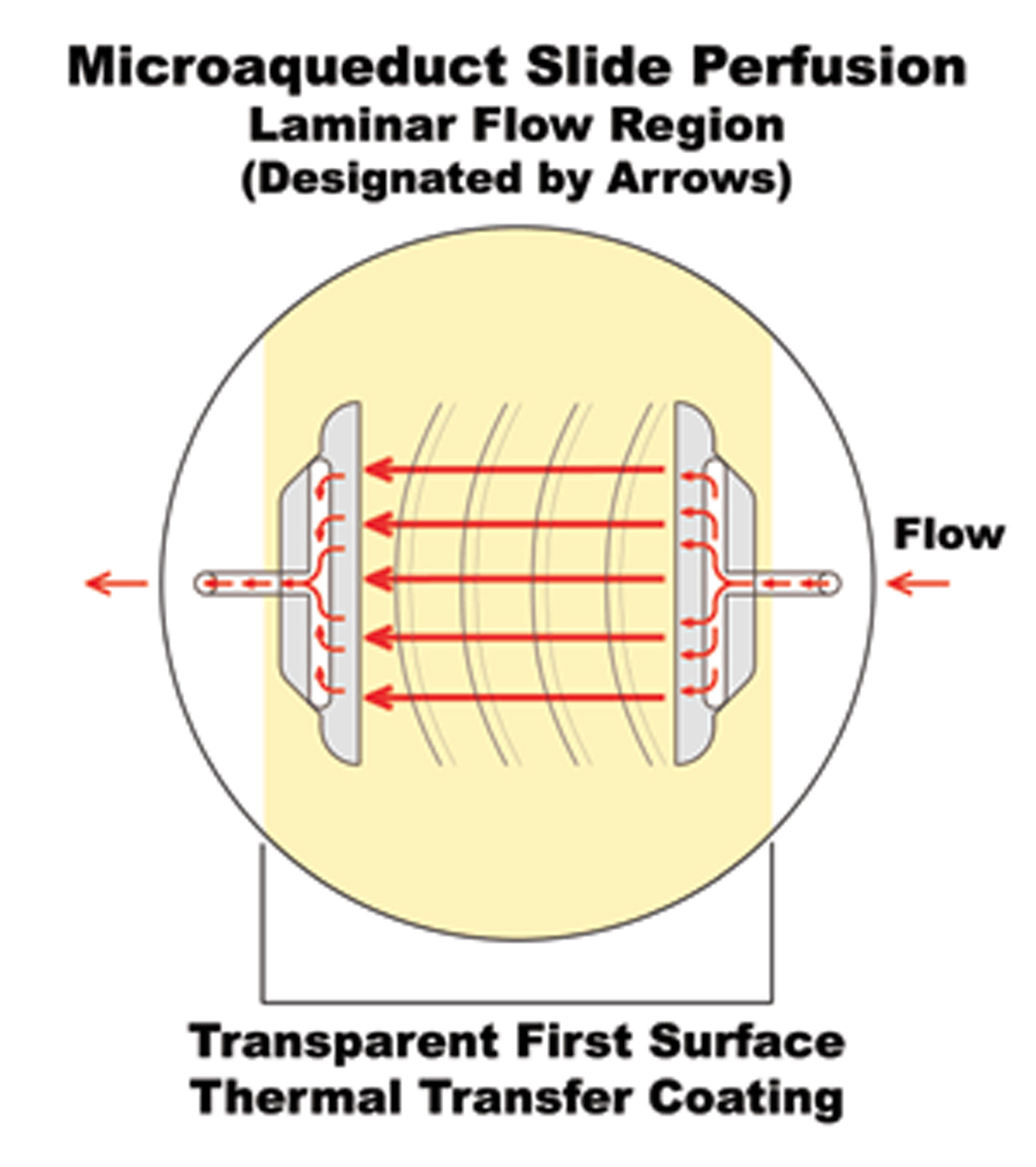 The precision flow of the chamber is achieved by our patented microaquduct slides. A fluid pathway is formed by separating the Microaqueduct Slide from the coverslip containing cells with a single silicone gasket. This gasket can be any thickness from 50 micron to 1mm and any lateral geometry you choose or create. This arrangement allows the user to define the flow characteristics. Therefore, you are not limited by the geometry of the optical cavity. Instead you select or create it! Fluid access to this flow channel is made through two 14-gauge needle stock tubes protruding from the sides of the chamber top. These tubes provide fluid connection to two perfusion holes in the Microaqueduct Slide that interface two “T” shaped grooves cut into the inner surface of the Microaqueduct Slide. The “T” groove allows the media to seek the path of least resistance and become nearly laminar before flowing across the cells. This technique eliminates the need for the metal perfusion ring and additional gaskets, which are the limiting factors, required by most conventional chambers.
The precision flow of the chamber is achieved by our patented microaquduct slides. A fluid pathway is formed by separating the Microaqueduct Slide from the coverslip containing cells with a single silicone gasket. This gasket can be any thickness from 50 micron to 1mm and any lateral geometry you choose or create. This arrangement allows the user to define the flow characteristics. Therefore, you are not limited by the geometry of the optical cavity. Instead you select or create it! Fluid access to this flow channel is made through two 14-gauge needle stock tubes protruding from the sides of the chamber top. These tubes provide fluid connection to two perfusion holes in the Microaqueduct Slide that interface two “T” shaped grooves cut into the inner surface of the Microaqueduct Slide. The “T” groove allows the media to seek the path of least resistance and become nearly laminar before flowing across the cells. This technique eliminates the need for the metal perfusion ring and additional gaskets, which are the limiting factors, required by most conventional chambers.
By simply changing this one gasket you can change the volume of the chamber. This gasket can have any internal geometry you desire and can be any thickness from 0.1mm to 1mm. The drawing below shows the standard shapes of the gaskets that we include with every FCS2. We also include solid gaskets for you to custom fit to your application. Once you have found the shape that works best for your experiment, you can contact us to have a die made to those specifications. Examples of standard gasket outlines
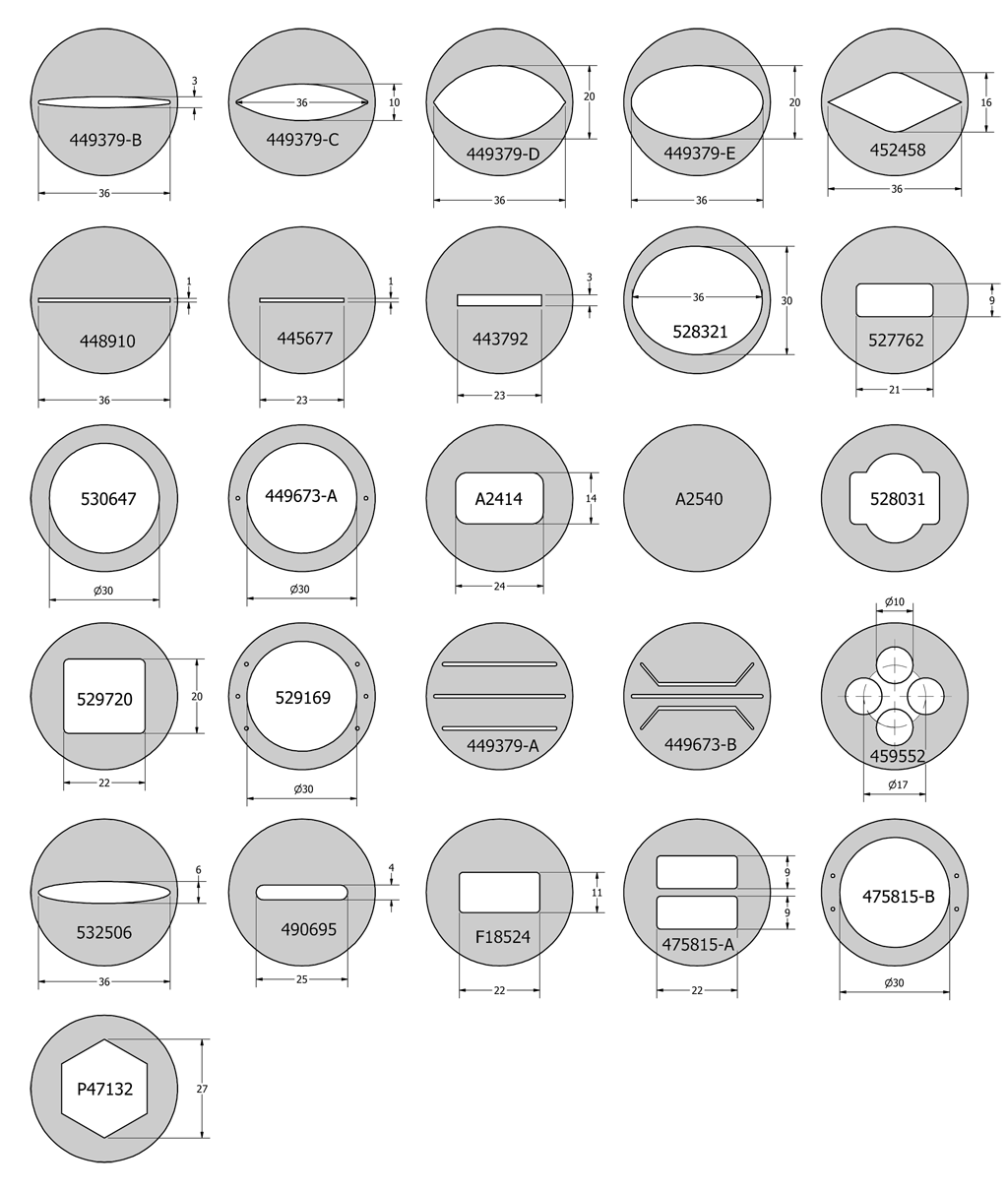
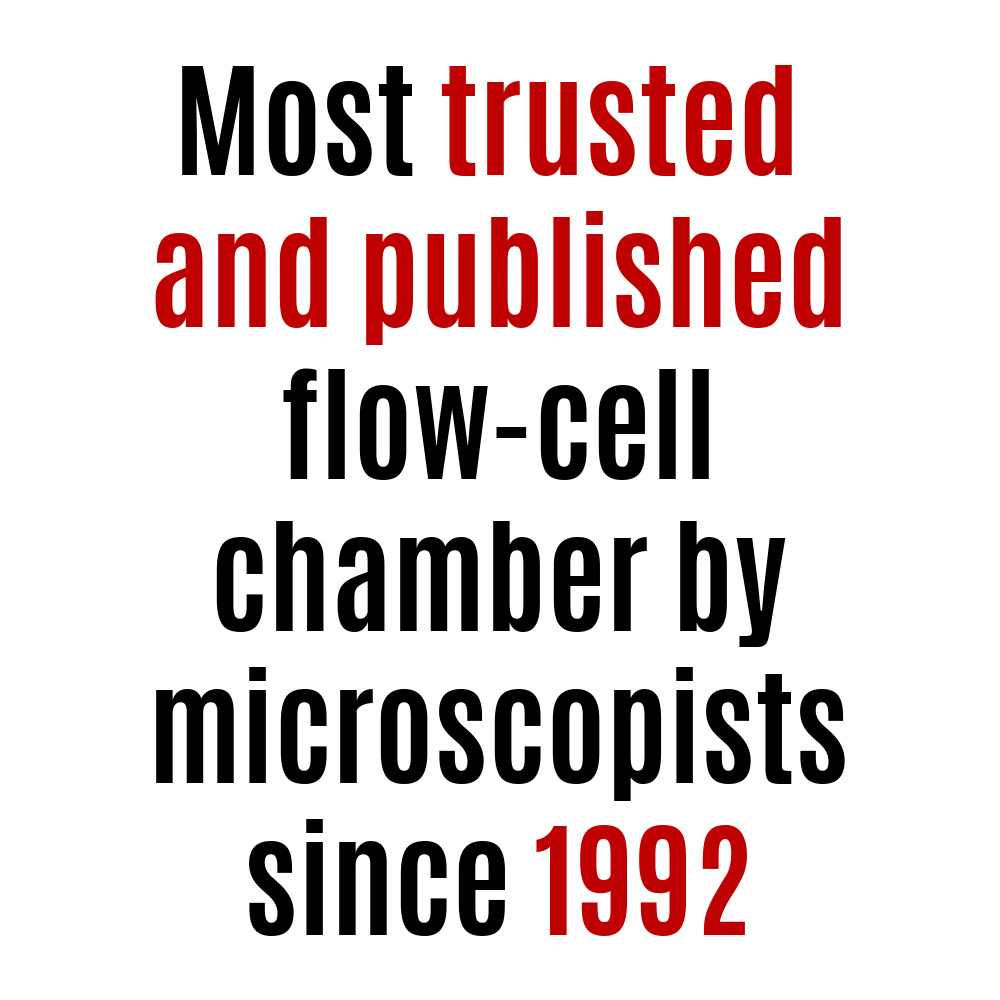
Chamber Break Down
FCS2 Chamber Features

Perfusion Set Up

3560 Beck Road
Butler, PA 16002
U.S.A.
sales@bioptechs.com
1-877-877-LIVE-CELL (548-3235)
(United States & Canada)
Direct: +1-724-282-7145
(United States & International)